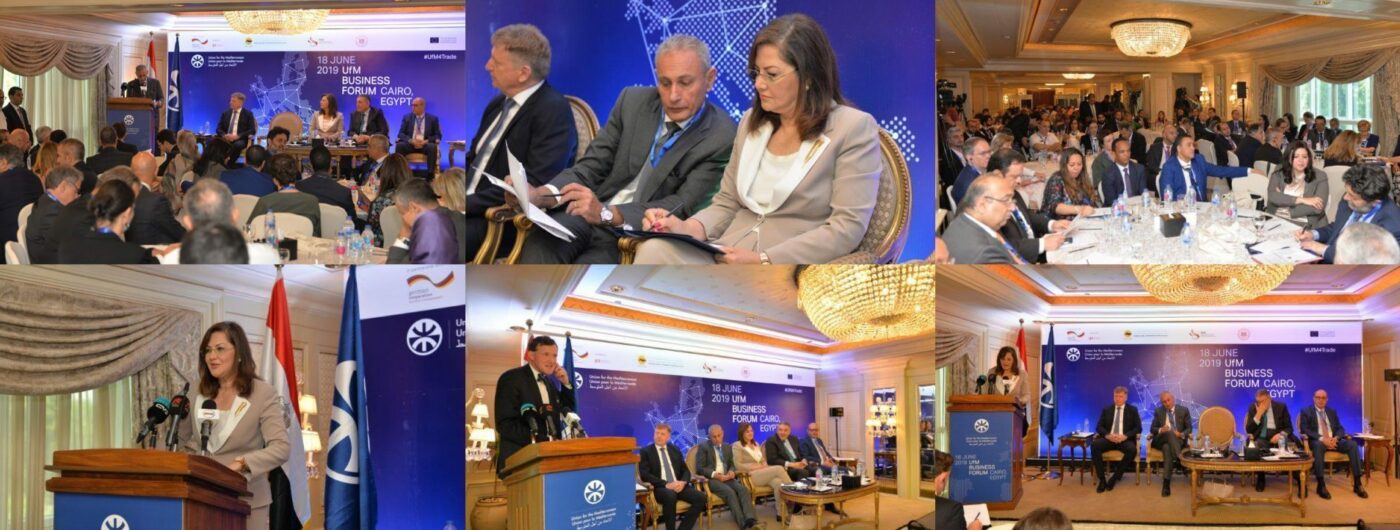
First UfM Regional Business Forum takes place in Cairo to promote the Trade Agenda and foster economic integration in the region
- Over 150 representatives of the private sector, civil society, governments and international organizations gathered in Cairo to discuss how to strengthen Market Access and e-Commerce in the Euro-Mediterranean region.
- The Forum, which comes as an immediate response to the mandate tasked to the UfM Secretariat by the Trade Ministers in 2018, is the first UfM event fully dedicated to Trade.
- The UfM reiterated its support to the Agadir Agreement and announced the launch of a capacity building programme in collaboration with the Deutsche Gesellschaft für Internationale Zusammenarbeit (GIZ) GmbH.
- The UfM region remains to be one of the least economically integrated regions in the world in terms of trade and investment flows.
Cairo (Egypt), 19 June 2019. Acting upon the UfM Ministerial mandates and in line with the UfM Roadmap’s emphasis on ensuring the contribution of UfM activities to regional stability and human development efforts, the UfM Secretariat organized its first UfM Business Forum fully dedicated to Trade on 18 June 2019 in Cairo, Egypt, in partnership with the Deutsche Gesellschaft für Internationale Zusammenarbeit (GIZ) GmbH, the Association of Mediterranean Chambers of Commerce and Industry (ASCAME) and the Egyptian Commercial Service (ECS). The Forum which was held under the auspices of the Minister of Trade and Industry of Egypt, and opened by the Minister of Planning, Monitoring and Administrative Reform, Hala Elsaid, also saw keynote speeches of Niklas Johansson, State Secretary to the Minister for Foreign Trade of Sweden and João Torres, Secretary of State for Consumer Protection of Portugal, focused on two interrelated themes, namely Market Access and the e-Commerce.
The Forum brought together 150 stakeholders and representatives of governments, business communities, think tanks, trade negotiation circles, as well as regional and international organizations. The participants engaged in open discussions and exchange of experiences and best practices with the aim of identifying actions that can deliver the full benefits of e-commerce and those of a more open and integrated trading system in the region.
During his opening speech, the UfM Secretary General, Nasser Kamel, pointed out that “trade and investment hold the key to unlocking one of the most drastic economic realities in the Euro-Mediterranean region, namely the fragmentation and the meagre level of regional economic integration, which rank among the lowest in the world.”
The UfM Region remains to be one of the most economically fragmented regions in the world, with trade flows sharply skewed towards a higher concentration in the EU (90% of all Euro-Mediterranean trade flows), with a further 9% between the EU and its Southern and Eastern UfM neighbours, and only 1% of South-South trade flow.
Throughout the Forum, the participants stressed the need to fully implement and operationalize the existing bilateral and regional trade arrangements in the UfM region in order to promote economic integration in the Euro-Mediterranean area, and highlighted the fact that deeper and more comprehensive trade relations need to include new sectors and effectively tackle non-tariff measures in the region. Capacity building, technical assistance, and the transfer of knowledge and expertise are indispensable for a functional trading system with a robust regulatory framework and for the full use of free trade opportunities. They also highlighted the Agadir Agreement as a good example on South-South Cooperation in the field of trade, which merits political, financial and technical support and promotion.
The Fourth Industrial Revolution is a game-changer for global trade. New disruptive digital technologies are generating unprecedented opportunities and challenges, and unleash an accelerating rate of interconnectedness and just-in-time demands to which trade needs to adapt to in a fast and a smart manner. Moreover, the bundling of goods and services together in the digital era requires a new level of inter-agency coordination at the policy level. It calls for a holistic policy whereby policymakers would need to develop coherent agendas.
During the Business Forum, UfM Secretary General Kamel conveyed the support of the UfM to the Agadir Agreement and announced new means to promote it further: “The UfM Secretariat would like to back and further substantiate its commitment to promoting the Agadir Agreement by offering to the Member States of the Agadir Agreement its support to hold technical trainings in the area of trade policy, in cooperation with GIZ,” he stated. “Such trainings would encompass issues such as Rules of Origin, the classification of goods, origin certification and other technical trade issues, which will be based on the needs in the region. It is an endeavor that could prove particularly useful considering the ongoing revision of the Regional Convention on Pan-Euro Mediterranean Rules of Origin (PEM Convention) ”, he added.
The UfM Business Forum serves as a first step towards a structured dialogue on Trade that will see further editions of the Forum over the coming years to promote trade and investment in the UfM region, and to contribute concrete recommendations that would feed into the coming UfM Ministerial Conferences on Trade.

